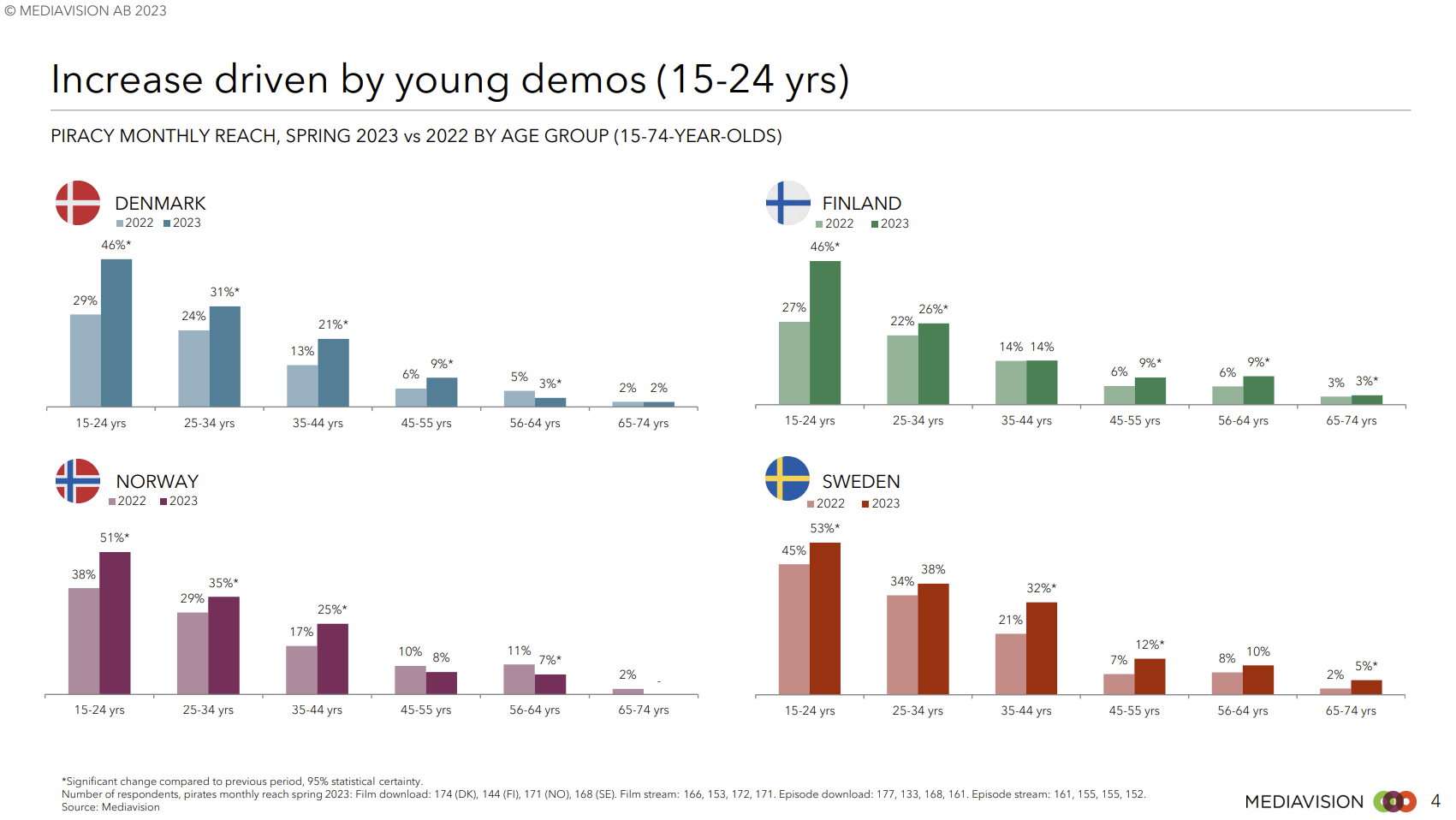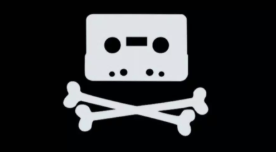-
chevron_right
Sharp Rise in Piracy Rates Across Sweden, Denmark, Finland & Norway
news.movim.eu / TorrentFreak · Wednesday, 24 May, 2023 - 20:26 · 4 minutes
 Mediavision has been tracking citizens’ piracy habits across the Nordic countries since 2010. The company’s annual report for Spring 2023, based on a survey conducted in March, has just been released.
Mediavision has been tracking citizens’ piracy habits across the Nordic countries since 2010. The company’s annual report for Spring 2023, based on a survey conducted in March, has just been released.
With Sweden, Denmark, Finland and Norway under the spotlight once again, Mediavision’s pan-Nordic consumer survey aims to measure unlicensed content consumption among 15 to 74-year-old respondents, across categories including movies and TV shows, and access to both via pirate IPTV services.
Overall Piracy Rates Increase
With no obviously positive news to distract, poor figures across all four countries take center stage.
Denmark, a country with an overall movie and TV show piracy rate of 11% in 2014, now has an overall rate of 20%, up from the 13% reported in Mediavision’s survey in 2022.
With an overall rate of just 8% in 2014, increases over the years led to a 13% overall rate for Finland in 2022. A four point rise over the past 12 months pushes Finland’s overall movie and TV show piracy rate to 17%.
Since 2014, overall unlicensed consumption of movies and TV shows, in both Norway and Sweden, adopted a broadly U-shaped curve. With reducing piracy rates indicating signs of progress in the middle, high rates of piracy seen in 2014 are back on display in 2022, and then some.

Overall movie and TV show piracy rates for Norway now stand at 22% versus 18% last year, with Sweden at 25% and 20% respectively. Mediavision reports that in all four countries, the usual suspects are driving the increases.
Young People Push Up Piracy
Technologically adept and hungry for content, young people often make a disproportionate contribution to piracy rates. Through various programs, rightsholders have reached out to kids of all ages, hoping to encourage negative attitudes towards piracy from an early stage.
From kindergarten copyright classes in the United States, to a current project in Denmark that will pay teens to assist with piracy research, most things have been tried.
Mediavision’s latest study reveals that piracy increases are being driven by young people in the 15 to 24-year-old group, across all four countries. The concern for rightsholders lies in piracy’s monthly reach, which was unacceptably high last year and is now considerably worse.
According to last year’s report, 29% of young Danes engaged in movie and/or TV show piracy. The latest figures show a leap to 46%, a figure that puts Denmark on equal footing with Finland, where rates rose to 46% from the 27% reported last year.
Norway’s increase, from 38% last year to 51% this year, is slightly less steep, leaving Sweden with the surprise upper hand.

The eight percentage point increase attributed to young Swedes in this year’s survey is less than any of its regional neighbours. Unfortunately, Sweden’s last set of results in 2022 indicated that 45% of its young people engaged with piracy, a figure that has now risen to 53%. That suggests that every second young person in Sweden today is a pirate
Access to Pirate IPTV Services
Mediavision’s Spring 2022 survey found that across Sweden, Denmark, Finland & Norway, just under 0.9 million households subscribed to an illegal IPTV service.
With the largest population, Sweden accounted for more than 40% (380,000) of IPTV-equipped households across the region. With 230,000 subscribed homes, Norway was runner-up, with Finland (155,000) and Denmark (125,000) taking the remaining spots. Taking population into account, Norway’s 10% share beat Sweden’s 9% into second place.
Following the release of these figures last year, entertainment companies warned that use of pirate IPTV services was on the increase in the Nordic region. According to the latest survey, the prediction was spot on.

The latest figure of 1,150,000 households represents a 29% increase over the 890,000 households reported in 2022. With 490,000 and 255,000 households respectively, Sweden and Norway are the leading consumers of IPTV by volume, pushing Denmark (220,000) and Finland (190,000) into third and fourth place. By share, Sweden and Norway tie with 11% each, leaving Denmark (9%) and Finland (7%) to complete the set.
And Now The Good News
In contrast to the gloomy picture painted by the latest survey, other recent reports published by Mediavision signal positive trends in legal content consumption.
“Online video in Finland is on the rise. During this spring, subscribing SVOD households have passed 1.5 million, corresponding to a penetration of 61 percent. This equals an annual growth of 8 percent in subscribing households,” the company notes .
In Sweden, where piracy habits are on the rise, legal consumption is going in the same direction.
“Today, over 90 percent of households in Sweden pay for some form of media subscription,” another Mediavision report begins. Despite rising interest rates, inflation and increased financial anxiety, there is no sign of a slowdown in paid media.
“On the contrary, Mediavision’s latest analysis measures a new record level for households’ total media expenditure. Households pay the most for TV and streaming subscriptions,” Mediavision reports .
Denmark’s situation also appears less gloomy than its piracy rates suggest. After adding half a million in 2022, there are now over four million paid VOD subscriptions in Denmark, from a total population of less than six million.
Mediavision also notes that around three million subscriptions in the Nordics are shared accounts, paid for by the subscriber but enjoyed for free by others. With further sharing crackdowns looming on the horizon, the question is whether legal platforms or pirate sites stand to reap the most benefits.
Mediavision’s Nordic Piracy Report 2023 is available from TTVK ( pdf )
From: TF , for the latest news on copyright battles, piracy and more.
 More than eight years ago, internet subscribers in Finland began receiving letters claiming that they owed hundreds of euros to companies they’d never heard of.
More than eight years ago, internet subscribers in Finland began receiving letters claiming that they owed hundreds of euros to companies they’d never heard of.
